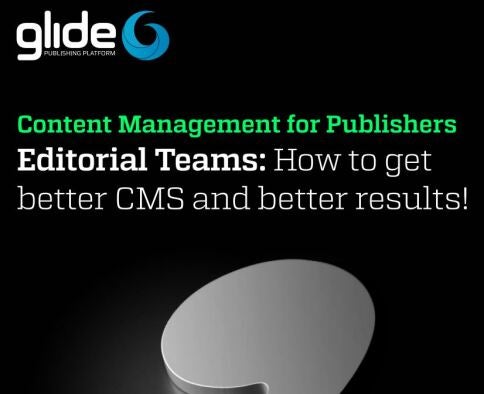
Partner Content*: Former managing editor of regions at The Sunday Times Tony Allaway shares his sub-editing tips for the digital age. Published in association with Glide Publishing Platform.
Consider the following sentence about Rishi Sunak’s March 2021 budget, which has stuck with me for longer than it should:
“The super-deduction measure was innovative and will have a massive event on investment over the next two years.”
Simple enough to spot the error. In the unlikely event that you didn’t, it should of course have been ‘effect’. The sentence was in an article on a serious online political website. Small beer in itself, most likely a casualty of predictive text. But it was also likely a casualty of something else: no sub-editing.

Think for a moment about that error. You are momentarily stopped in your tracks working out what it meant to say. That’s disruptive and annoying. When it happens more than once in the same article (as it did in this) you start to fume a little. When it happens in other articles on the same website you get really ticked off . Not a good look for a serious political website.
You could cut the site some slack: it’s free, relying on voluntary contributions, so I imagine it’s living a bit hand-to-mouth. But not ensuring proper final editing is a false economy, because making too many mistakes turns readers away. You need readers. You need sub-editors.
Subs are the heroes and villains of the publishing process. I caught this online description of them as “folkloric pranksters who creep from obscurity to leave evidence of their wickedness in the everyday world”. I wish I had a pound for every time I’ve heard them called “butchers” and “failed reporters”.
In a very few cases those epithets might be merited. I have come across subs who foolishly think writers are fodder for their own literary genius. It generally ends in tears. But more often than not good subs are what save a Guardian from becoming a Grauniad.
Their role is often much misunderstood, especially by those who should know better: publishers and editors who think the writer can easily check his own work and go straight to print. This has been greatly facilitated, of course, by the digital age.
The mistake I recalled above is a very minor example of what can go wrong. Even paid-for news apps can contain absolute horrors, I assume because the text has been shovelled in before any proper editing has taken place. The time a writer spends on checking facts, spell-checking etc – and doing it properly can take a good bit of time – is time not spent on their primary function, gathering information and writing it.
Subbing has moved on greatly from when I started on a local daily newspaper in the days of the dinosaur: lots of paper (and glue); a special system of marking text so the compositor (the person who turned it into strips of lead in those hot metal days) could understand your changes; counting headline characters in an attempt to make them fit (one and a half for ‘w’, ‘m’ and any capital, half for ‘i’ and ‘l’). We possessed whole tables of fonts and their character counts at various sizes. And don’t get me started on points, picas and nonp (short for nonpareil). But you never knew if anything actually fitted until the physical lead page was made up, which was why a special breed of ‘stone sub’ was necessary for last-minute fixes.
We not only had subs but proofreaders, squirreled away in a room with just table lamps, all wearing green eyeshades. Even the compositors played their part, pointing out errors at the last minute.
Other than just ahead of deadline, things were quite relaxed. In my first days as a sub on The Times the chief sub would stroll up with a sheaf of copy, expecting me to trot off to the library and spend a leisurely time checking the facts before returning to edit.
As budgets were tightened and waves of clipboard-bearing consultants waltzed through, the process was tightened. Numbers were cut and the newspaper libraries that supported their work closed until we got to the digital age, when many subbing duties changed dramatically. ‘Casting off’ to make a story fit in a page and writing a witty or attention-grabbing headline to a specific length have become meaningless in an online setting, where length is of less concern and headlines need to catch the attention of web search engines more than actual readers. Inserting links to websites, videos and audio: all vital new skills in the process.
There are, however, some fundamentals that distinguish a solid publication from a sloppy one. Subs are the custodians of journalistic quality and effectively the publication’s ‘first line of readership’. If something worries them, it will worry the reader too.
Promoted whitepaper – How editors can get the most out of their CMS: Download Glide’s free in-depth guide packed with useful advice and tips:
Subbing essentials:
Accuracy
Every mistake is one egregious error too far: names, ages, dates, events, quotes, everything has to be checked. I saw this at its best at The Sunday Times, by far the most assiduous subbing operation I witnessed, although I was never a sub there. Subs were required to put a hidden electronic tick against every fact to show they had checked it and ended up in deep trouble if they were caught fibbing.
An excellent command of English is essential. But you have to adapt, albeit sometimes slowly, to the way it changes too. Where there are subs there will always be pedantic arguments over whether, for instance, ‘over’ can be used instead of ‘more than’. After the Associated Press allowed this, one response was: ‘More than my dead body!’. When something becomes generally accepted you mostly have to give in gracefully, although don’t get me started on ‘centred around’. If you don’t know why that should never be accepted, learn some English.
Style
Every organisation worth its salt has a house style, to help it stand out from the crowd and ensure consistency. It is a sub’s duty to make sure writing conforms to that style. At The Times the Oxford Dictionary for Writers and Editors (Odwe for short) was an essential aide, if only to check whether certain words ended with ‘ise’ or ‘ize’ (the latter if the root was Greek). The paper was a stickler for such niceties. Today’s online sites tend to be more prosaic. The Buzzfeed style guide contains such entries as blowjob (one word), camel toe (two) and cockblock (no, me neither). Times change.
Do we allow split infinitives; do we use Mr and Mrs etc and do we only use the English version or use foreign appellations too; what are the correct titles for royalty? So wondrously varied are the eccentricities of individual publications that a style book can easily get out of hand. Somehow, a sub has to know it all.
Clarity and readability
Here’s the tricky bit. When I was working on The Times business desk, under a chief sub by the name of Bill Bryson (yes, that Bill Bryson), I queried an impenetrable story with its author. With a withering look I was told it had been written “to be understood by five people in the city. The rest don’t matter”. He was too senior for me, a mere casual at the time, to argue, but it rankled.
There is a fine book by the late Leslie Sellers of The Daily Mail, The Simple Subs Book, which became my bible in the early days. In it he quoted Arthur Christiansen, editor of The Daily Express back in its heyday, exhorting his troops to ‘remember the people in the back streets of Derby’. If they couldn’t understand the piece it wasn’t fit to print.
The extent to which subs can alter writing varies between publications (on some it’s de rigueur, on others done almost exclusively by the newsdesks, on yet others effectively left alone). At the very least, if a sub comes across something that doesn’t make sense or reads awkwardly, they should seek out the author to agree changes. Muddled, illogical or turgid copy should not be let through (though see above).
Editing should make a positive difference. Unless dealing with a hopeless writer, I went out of my way to be sensitive to the writing style and what the author’s priorities appeared to be. I remember once getting a rare ‘herogram’ from a correspondent whose feature-length copy had to be cut by three quarters. ‘Thanks, I didn’t notice the joins.’ But there’s no doubt it is a challenging part of the enterprise.
Where a sub’s own writing skills can really come into play is in melding various sources into a coherent story, as in fast-breaking news with material coming from correspondents and agencies. Someone skilled at doing this in a hurry and producing a good read at speed is worth their weight in gold.
There’s many other things for subs to do: sub-heads, pull-out quotes, captions: all important in gaining the reader’s attention and making the item attractive to read. It requires speed and a lot of thought and concentration. Done well, it makes a huge difference.
I can understand why bean-counters, casting around for savings and gazing at the motley crew staring at screens all day without creating anything, might think they can save a bob or two by casting them aside. If it’s a pile ’em high and sell ’em cheap type of publication, maybe they won’t suffer. But any organisation that aspires to any level of quality in its output makes a dangerous mistake if it thinks it can do without subs.
Email pged@pressgazette.co.uk to point out mistakes, provide story tips or send in a letter for publication on our "Letters Page" blog


